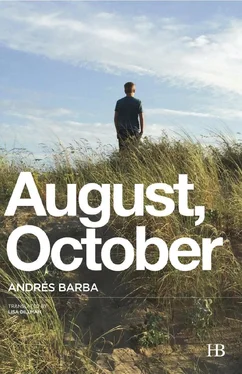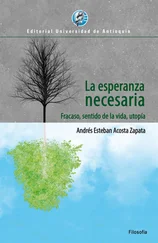“I was very pretty, for how long? Ten years? I should have taken advantage of it at the time. Sometimes I think you get to a crossroads in life — one way,” she pointed with a pudgy hand, “and another way,” and with the opposite hand she gestured in the other direction. “But you need a third option, the real one, the one that’s not offered; you do what you think you want, and it’s never really what you wanted, and in the end you lose your talent.”
Later, in the kitchen, while his parents were clearing the dishes, he overheard his mother speaking to his father.
“Your sister is stark raving mad, what’s gotten into her?”
“I don’t know, I told you yesterday. She’s been like this since we got here,” his father responded, concerned.
He himself had been so absent the past few evenings that he hadn’t realized they’d been discussing it for days. It was obvious, though — something in Aunt Eli had been thrown out of whack. She’d behaved like that throughout dinner, and when they said goodnight and his parents told him to walk her home, she stood for a second at the door, kissed his father, and said simply, “I’m no good at being sick.”
And then, to Anita, “Aunt Eli didn’t frighten you, did she, Anita?”
Anita fired back with a booming no ! her eyes screwed tight as pins. It was impossible to know what was going on inside her when she was like that.
Aunt Eli lived almost all the way on the other side of town, in one of the last few houses before those fronting the estuary. It was a Sunday night, and there were very few people on the promenade, plus it was late, because dinner had gone on and on. All of a sudden her body smelled sweet, like cinnamon. He remembered, too, the faint scent of cheap food and talcum powder at her house. It was a small house where she’d lived with her husband for fifteen years until he died. They’d had a prosperous shrimping business for many years and actually owned a small fleet of four boats but lost two of them one day in rough waters, and when it came out that the boats didn’t meet all of the safety standards, the families of the fishermen killed in the incident sued. They lost everything they’d saved up over the course of ten years. One of the two remaining boats burned down at the shipbuilder’s, while it was being repaired. That left just one, and they never managed to rebuild their business, it just slowly languished. When her husband died, Aunt Eli sold the last boat, the Lady Pepa II . He remembered a photo of himself, with Anita when she was a baby, sitting on the Lady Pepa II ’s nets. As for his uncle, he had only one distinct memory of him, of a day when they spent all afternoon together and he’d crouched down and said, “Now, take a look at this — I bet you’ve never seen anything like it in your life.”
He’d pulled a huge wad of bills out of his pocket and deposited it in his hands.
“Come on, kid, take hold of it, it’s not going to bite.”
He recalled feeling the unusual weight of that wad of cash in his hands, a weight both inconsequential and unsettling, like that of a sick bird.
“I don’t want to keep going to the doctor,” Aunt Eli said on their way back to her house, walking along the esplanade. “What can he do for me?”
“I don’t know, Aunt Eli.”
“Take a good look at me,” she said, stopping. “I’m ordinary. I’ve turned into an ordinary woman. That’s the one thing I’ll never forgive myself for — having become an ordinary woman. Never turn into an ordinary man.”
“I won’t.”
It was dark out, and hot and muggy. A light breeze jangled the pulleys on the boats moored at the estuary, and the current made them all bob softly, unevenly. Suddenly he was certain he’d think back on that scene in the future, that precise moment — Aunt Eli calling herself an ordinary woman, how pale she was, her illness practically glowing in the night, her head listing forward and rocking back, as though she, too, were affected by the tides. It was weird — in addition to being obese, she also now seemed diminutive. Diminutive and fragile, as though her life were trembling inside her. They walked slowly and didn’t speak again until they’d almost reached her house.
“You’re up to something; there’s a glint in your eye,” she said.
“I’m not up to anything.”
“You’ve changed. You’ve done something, I can see it in your eyes.”
He made no reply. He’d never seen Aunt Eli act so bizarrely somber. She, in fact, was the one with a glint in her eyes, the one who seemed to have done something, the one who’d thrown all pleasantries to the wind.
“You’re just like your father when he was your age.”
“I know,” he said. He’d seen pictures of his father when he was young and always felt the same self-conscious shame, as though he were walking a straight line originally laid down by his father’s body, in black-and-white, so like his own. He didn’t like to be reminded of it. He waggled his head and squinted his eyes to shake off the likeness.
“First you’ll be restless, then you’ll calm down, and in the end you’ll become a kind and respectable gentleman. Do you know what you want to study?”
“Architecture.”
He’d been saying “architecture” for two years, an automatic response even though he’d actually stopped wanting it some time ago. It was a quick reply, one that put an immediate end to the conversation, bestowing a halo of awe on him for such precocity. He liked coming off as precocious and interesting, and architecture was the most exotic subject he’d been able to think of.
“You don’t look like an architect,” Aunt Eli declared.
“No?”
“No, you’ve got too much spirit.”
When he kissed her goodbye, he was surprised at how cold her skin felt, but his shock lasted only an instant, and as he walked back home, he strolled slowly, flattered by what Aunt Eli had said. So it was visible, he thought, the fact that he had too much spirit was visible. He felt jittery, full of life, though perhaps only due to the contrast — contemplating his own body and spirit and then comparing them to Aunt Eli’s. He saw a few girls he thought might be looking at him. He smiled. He almost wanted to turn to them and ask, Do you like me? Huh? You sort of like me, right ?
There were girls in their crowd, too. Girls who were like the inverse of Pablo, Marcos,Tejas, and Rivero. The first time he saw them by the estuary, their faces, too, had all seemed like one; he’d been with the boys, and they all said hi, walked over, and sat on their towels. How many were there? Seven? Eight? The first day, their faces all blurred together, swimming around him. They must have been thirteen or fourteen years old. As he turned around, he heard one of them ask, “Where’d you get him ? I’d like to get a taste of that . .”
And Rivero, “He’s all yours.”
But when he turned to look, there was no one specific face. They looked like a garden, laid out in rows, with an untamed sweetness about them; their bodies weren’t exactly slim, weren’t like the girls from the club, weren’t like those he knew in the city, they had an unfamiliar plumpness, an unfamiliar scent, an unfamiliar texture. Their faces were daring and naïve and silly, their chins round, their arms healthy and firm, their thighs strong, their chests well developed, they produced in him a strange, carnal chafing, they were sweet, clumsy, guileless, giddy, selfish, shrieking. He had the vague, vain impression that any one of them would have taken him, that he could have approached any one of them on one of the few nights left of vacation and said will you suck my dick? and that they — their unremarkable features worn as seashells on the shore — would do it, with a bored air, maybe. He didn’t especially like any one of them in particular, and yet all together they transported him into an uncharted physical territory. They talked — what did they talk about? It didn’t matter.
Читать дальше












